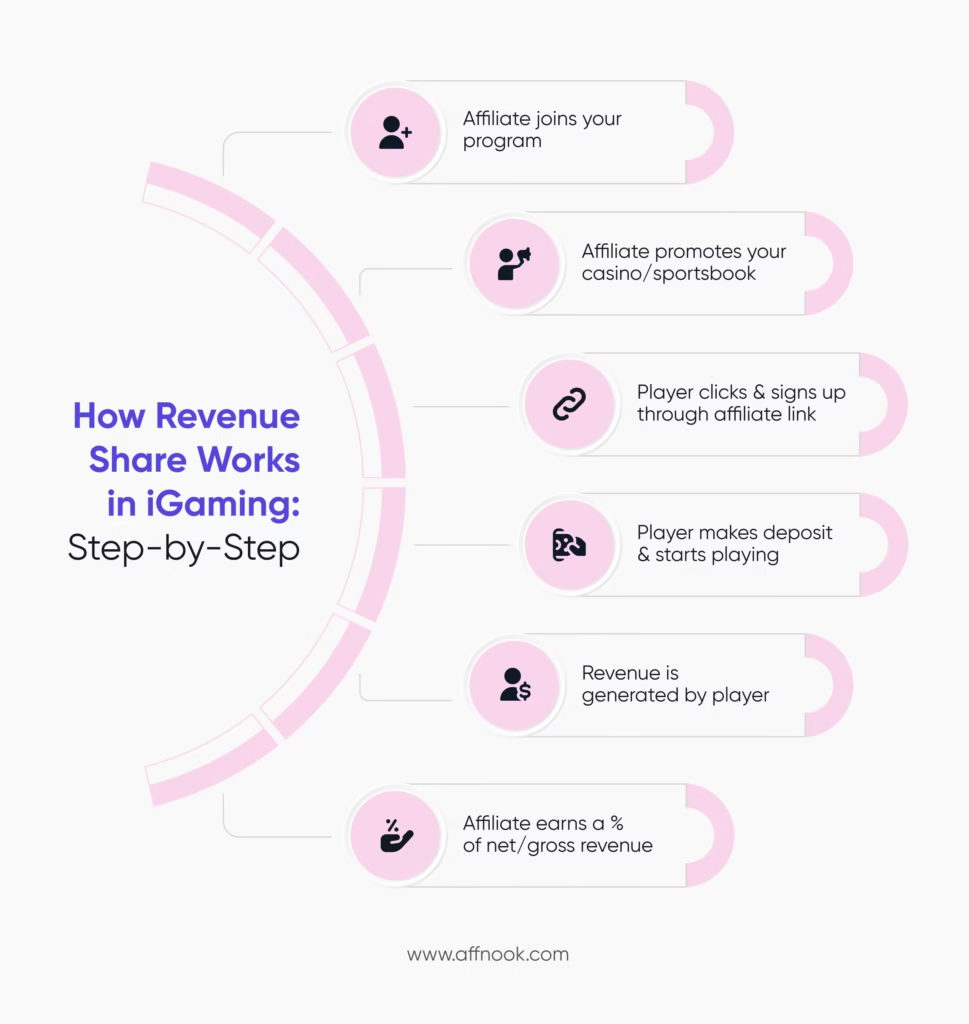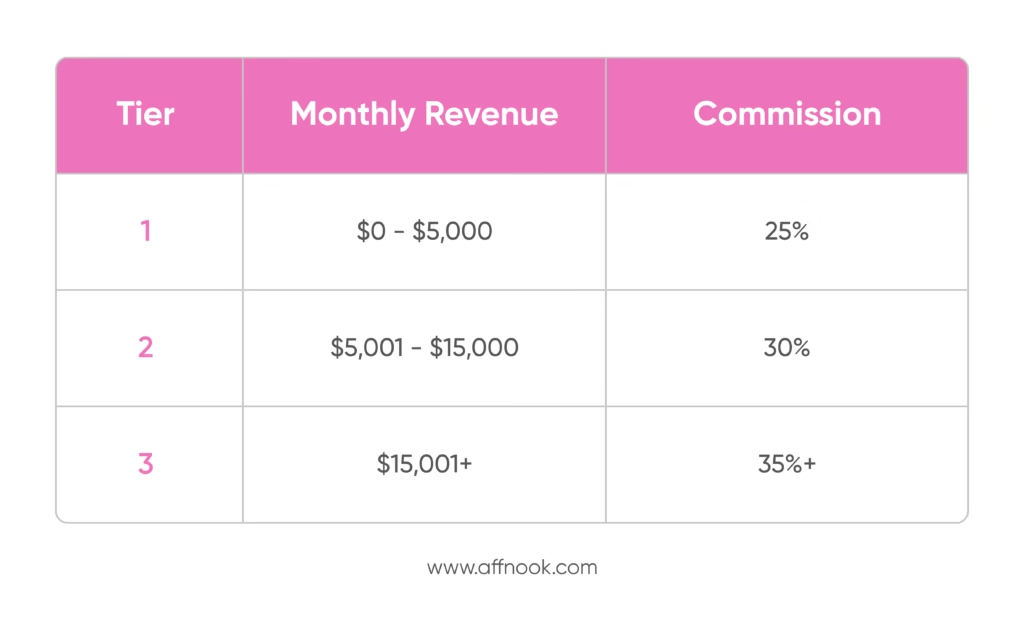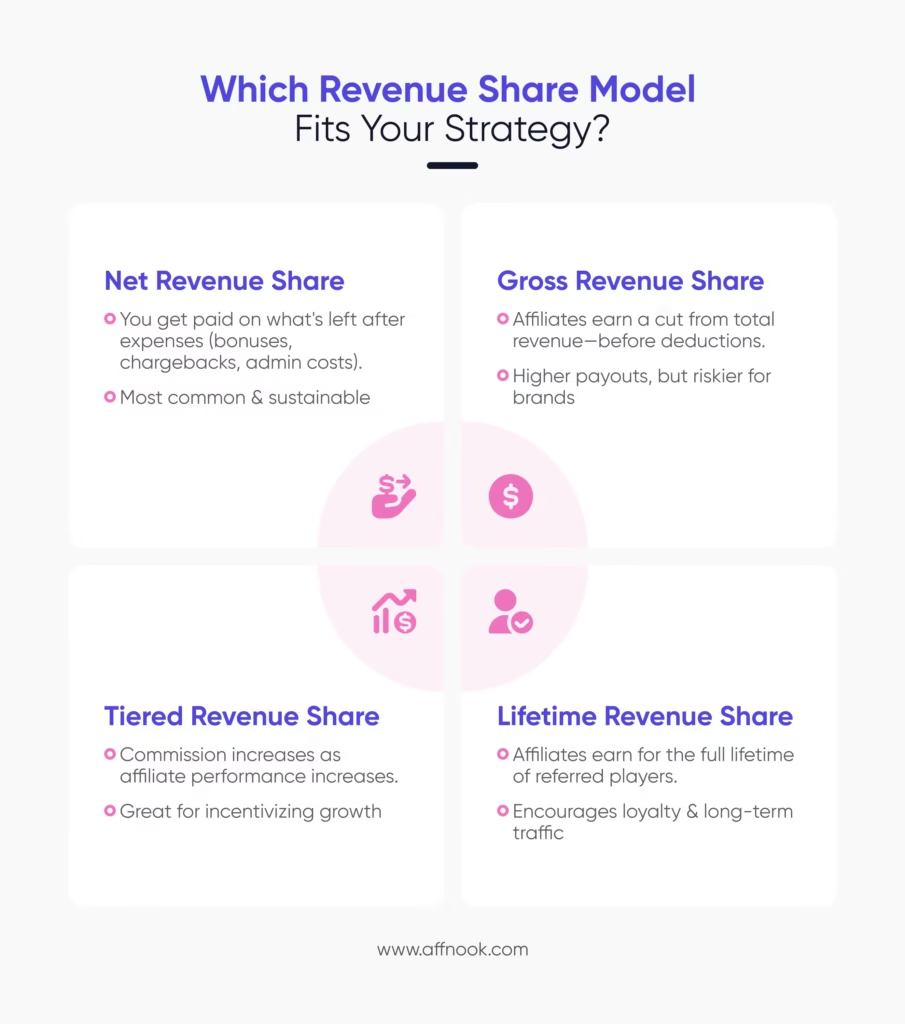Picture this: You join forces with an affiliate. They direct traffic to you. You sign up players, have regular play, and share monthly revenue. No upfront payout. Just mutual growth and long-term value.
Welcome to the world of revenue share—it is one of the most lucrative and performance-driven in the iGaming industry. No matter whether you are a new operator with an affiliate program or an established brand expanding your affiliate program, you have to know how the revenue share model works (and how it can be used wisely).
So how does it all work?
What is Revenue Share?
The iGaming industry uses the term ‘revenue share’ to describe a type of commission-based arrangement through which affiliates receive a percentage of the net revenue generated by players they refer. Affiliates under this model are rewarded by the actual performance of their referrals, usually by a percentage of the net or gross revenue generated by their casino, sportsbook, or poker play.
To illustrate, suppose an affiliate refers a player who deposits regularly and plays actively over several months. Even if the player’s win or loss fluctuates, their consistent engagement generates steady revenue for the operator.
Role of Revenue Share in Brand-Affiliate Relationships
Revenue sharing takes care of the interests of both parties:
- Affiliates are encouraged to deliver quality visitor traffic that sticks.
- The operators are only charged when they make a profit.
This generates long-term partnerships, particularly when combined with lifetime revenue sharing arrangements, whereby the deal structure motivates the affiliates to develop everlasting traffic funnels.

Common Revenue Share Models in iGaming
Net Revenue Share
This is the most prevalent one. The affiliates earn a ratio of the net revenue, a calculation that is arrived at after expenses such as bonuses, administrative charges, frauds, and chargebacks have been deducted. It is good for sustainable payments, but the deductions result in lower commissions than gross shares.
Gross Revenue Share
In gross revenue share, the affiliate will receive a percentage of the total revenue, before deductions, in this model. Although appealing to affiliates, it is less frequent because it involves a greater risk to operators.
Tiered Revenue Share
The greater the number of players referred by an affiliate or the amount of money that is earned by the affiliate, the greater the percentage of earnings. The tier-based models promote volume and performance as incentives are given on a progressive basis.

Lifetime Revenue Share
Under lifetime revenue share, affiliates get their commissions as long as the referred player stays active. This framework is ideal for operators interested in retaining players and establishing high affiliate loyalty.

Revenue Share Agreements: What Brands Should Know
Key Components of a Revenue Share Agreement
In your revenue share agreement, calculations of commissions, monitoring, and payment are elaborated. It must be clear about the following:
- Net and gross revenue
- Frequency of payments (monthly, bi-weekly)
- Cookie duration and attribution regulations
- Percentage tiers
Managing Risk: Negative Carryover Policies
A hot subject. A referred player can win a lot of money and this would create a negative balance on that affiliate account. Negative carryover implies that the loss is carried on to the following month.
There is no negative carryover in some brands, and the balance of affiliates is reset to zero every month, which is a good offer to attract affiliates.
Contract Flexibility and Compliance
Make sure that your agreement conforms with both gambling regulations and GDPR. It must also include flexible provisions to vary commission structures depending on how players behave or the quality of traffic.
Revenue Share vs CPA and Hybrid Models
Advantages of Revenue Share for iGaming Operators
- ROI of loyal players in the long term
- Risk-mitigated payouts
- Promotes good traffic
When to Use CPA or Hybrid Commission Models
When your brand desires to market in volume rather than value, CPA (Cost Per Acquisition) is the solution—pay a predetermined fee for each player registration. However, a revenue sharing or hybrid model (CPA + revenue share) is more appropriate when it comes to lifetime value-oriented strategies.
The hybrid models pay affiliates within a short time and offer future incentives—great to balance cash flow.
Evaluating Affiliate Performance
KPIs to be monitored include:
- Deposit by player
- Churn rate
- Average revenue per user (ARPU)
- Player LTV
This can guide you to identify a model that will bring out the best performance and scale accordingly.
Best Practices for Setting Up Revenue Share Programs
Aligning Affiliate Commission with Brand Goals
Present lucrative commission plans depending on traffic quality. For example:
- Tiered plans for high-volume affiliates
- Lifetime rev share for affiliates with high LTV traffic
- Hybrid options for influencers or streamers
Tools for Revenue Share Tracking and Reporting
Use high-level affiliate tools such as Affnook to:
- Monitor player actions on the go
- Automate commissions
- Produce clear reporting dashboards
Increased trust is associated with transparency—and it increases the appeal of your program.
Onboarding and Educating Affiliates
Establish an intuitive and transparent onboarding procedure:
- Video tutorials
- Revenue calculators
- Account manager assistance
Explain your revenue share reasoning to affiliates, to increase conversions and retention.
Conclusion
Revenue sharing is not merely a payment method to affiliates—it is a long-term value-building strategy of the brands and their partners. This scheme in the iGaming affiliate marketing, where the retention of the players is essential, works such that nobody makes anything unless there is actual turnover happening.
To operators, revenue share will motivate affiliates to work on quality rather than quantity. The aim is to recruit not just players who convert but loyal, high-value players who will come back regularly, as opposed to pursuing quick conversions. This implies improved traffic, enhanced partnerships, and scalability.
Revenue sharing models can do well when designed effectively with flexibility in tiers, revenue over a lifetime, and open ROI tracking, compared to flat-fee models or CPA-based models. When both sides grow together, it is a win-win.
Help Section
1. What is a revenue sharing model in iGaming affiliate programs?
A revenue share model in iGaming refers to an agreement where affiliates earn a percentage of the revenue generated by players they refer, typically on a monthly basis.
2. How does lifetime revenue sharing benefit online casino operators?
Lifetime revenue share ensures affiliates remain motivated to send high-LTV (lifetime value) players, helping online casino operators build long-term retention and sustainable revenue.
3. Is revenue share better than CPA for gambling affiliates in regulated markets?
Revenue share is often more profitable long-term in regulated gambling markets, while CPA is preferred for short-term growth or quick player acquisition.
4. What should be included in a revenue share agreement for iGaming brands?
Key elements include the percentage split, revenue type (net/gross), payment terms, negative carryover policies, and player attribution details.
5. How can iGaming operators optimize revenue share programs for high affiliate retention?
iGaming operators can boost affiliate retention by offering competitive tiered commissions, clear reporting, flexible terms, and strong onboarding support tailored to performance.




